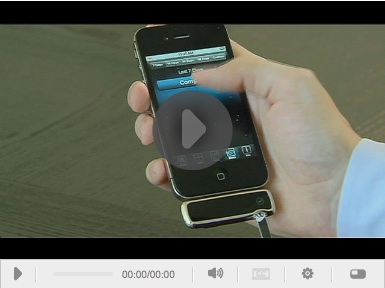In July a television company that produces news segments and feeds them to local network news stations across the country came to interview me at MobiHealthNews headquarters in Cambridge, MA. They asked me to demo a few medical devices and companion apps, including a connected blood pressure cuff, a WiFi-enabled weight scale, a skin scan application and a variety of other ones that didn't make the final cut. I was only involved in the interview on-site, but they had mentioned plans to find at least one person (other than me) in the area that used these apps in their daily life.
I was surprised by the final edit. My comments were well-represented even though they turned into a few sound bites after an hour of shooting, but that's the way it is in the television news business. No, the way the patient they found is using these apps surprised me.
The local CBS news affiliate's cut of the story started with a shot of a young mother tracking her infant daughter's pulse oximetry with an app on her iPhone that used the phone's camera and an algorithm that assesses changes in blood flow under the skin to determine heart rate. Her daughter has a heart condition called supraventricular tachycardia, or SVT, which according to the Mayo Clinic is caused by abnormal circuitry in the heart and creates a loop of overlapping signals.
The voice over narration does not mention a single device or app in the piece by name, but many if not all would be recognizable to a reader of MobiHealthNews.
"Meghan Cooper finds this approach helpful, particularly when it comes to her young daughter who needs constant monitoring," the reporter explains. As Cooper takes the heart reading with what is clearly the very popular Instant Heart Rate app from Azumio, Cooper explains: “She has a condition called SVT. I need to be able to check her heart rate on a regular basis so I’m able to do that with the camera.” The reporter then says, "so in this case her smartphone becomes a standby stethoscope."
Of course, Azumio does not officially intend or directly encourage those who download Instant Heart Rate to use it for tracking medical conditions. The description of the app in Apple's AppStore begins with this: "See every heart beat on the monitor, just like ER rooms." It also describes the app as "the same technique used by medical pulse oximeters is now available on your iPhone!"
"Currently, Azumio's focus is on developing mobile applications designed to improve user health and wellness, rather than dedicated medical solutions," Azumio's VP of Marketing Jennifer Grenz told MobiHealthNews in an email. "While we offer tools to gather bio-feedback data, Azumio does not diagnose health concerns or offer treatment plans."
Azumio's Instant Heart Rate app is not FDA-cleared.
"While we are not currently pursuing FDA approval for our apps," Grenz explained to MobiHealthNews, "Azumio is interested in providing leadership and recommendations to the FDA and other leading health institutions, based on our insights and data gathered from our 30 million satisfied users worldwide. The beauty of working in the mobile health space is that we are working in new, uncharted territory. As pioneers in the space, mobile health developers are part of an ever growing community, which is largely self-regulating. Through getting involved and learning together, health developers are creating new, innovative solutions for people around the world."
It is clear that Azumio is on the FDA's radar and has been since before the agency officially announced its draft guidance for the regulation of mobile medical apps. FDA policy adviser Bakul Patel included an image of Azumio's Instant Heart Rate app in his presentation about the draft guidance when it first published last year. Patel included the screenshot of the app on a slide about unregulated apps currently in the market that might fall into the proposed definition of a regulated mobile medical app.
Patel told MobiHealthNews in an email that one of the reasons he included the app on the slide was to show that if you offer a medical device that is already regulated by the FDA in the form of an app the FDA needs to review it so users have the same confidence in it. That said, Patel noted that some pulse oximetry devices are regulated and some are not -- those embedded in fitness machines or used for recreational purposes are not. "Those used in diagnosis or [for] managing certain diseases or conditions is where we would focus," Patel wrote.
From a regulatory standpoint, anyway, it matters more how a company markets a device, not how a consumer uses it. Finalized regulatory guidelines around mobile medical apps from the FDA are still forthcoming.


















